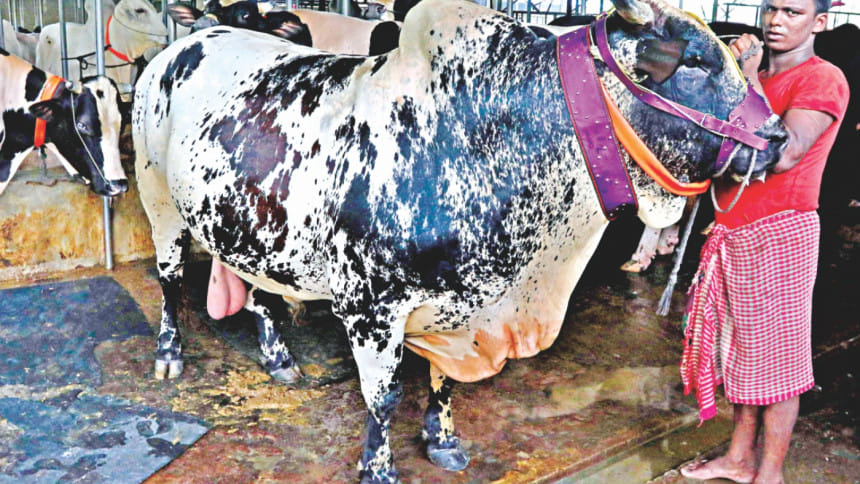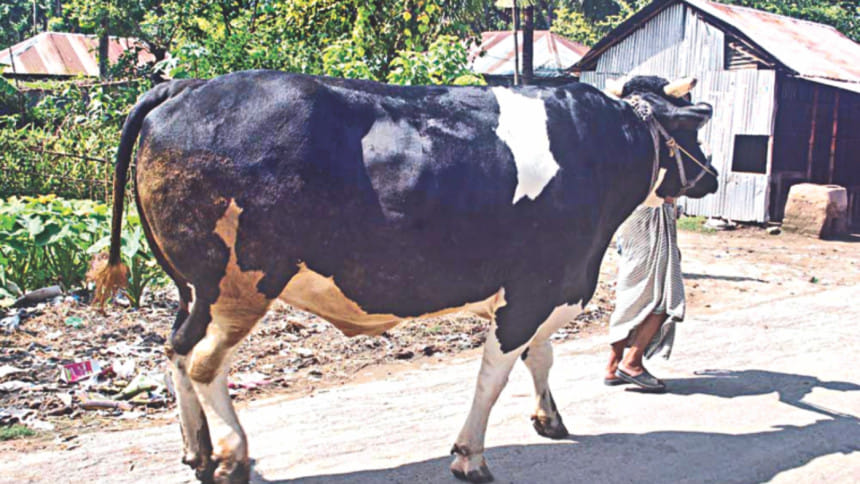Drugged, about to die

Anwar Hossain Ratan, a farmer from Malanchi village of Pabna, bought two bulls for Tk 2.6 lakh a year ago when they weighed 3 to 3.5 maunds each.
Now, the cross-bred bulls -- one 26-month and the other 28-month-old -- weigh around 10 maunds each. Ratan expects to sell them for around Tk 6 lakh before the Eid-ul-Azha.
He claimed that he had fed the bulls with rich fodder like wheat dust, rice and oil cake regularly and administered medicines prescribed by veterinarians.
“As my bulls didn't have any diseases and were properly fed, they grew faster,” Ratan said.
When pressed to know if he had used any steroid or hormone to fatten his cattle, Ratan said he used hormonal medicine Metaphetrol 100cc with AD3 vitamins a few months ago, the use of which is illegal if not prescribed.
Veterinarians said cattle traders usually use steroids and hormonal medicines three months before the Eid to speed up the growth of cattle and make them look fatter for higher prices, despite a ban on their use in cow fattening.
A lot of the times the cattle die just after three months of getting the drugs.
Nearly 50 lakh cattle are slaughtered during Eid-ul-Azha in Bangladesh.
In Sirajganj and Pabna, two major cattle producing districts of the country, growth hormones and steroids used for cattle fattening include Dexol, Dexovet, Metaphetrol with vitamin AD3, Carosit and Cataphos, Testosterone, Estradial and Progesterone, which is illegal if not prescribed.
A large number of cattle can also be found in Kushtia, Chuadanga, Jessore, Jhenidah, Mymensingh, Nilphamari, Barisal, Faridpur, Manikganj and some other districts.
Steroids and hormones cause accumulation of fluid in cattle body, making them look fatter, veterinarians said. Consumption of meat of these animals poses serious health risks, according to experts.
The Animal Feed Act 2010 prohibits use of antibiotics, growth hormones, steroids or other harmful chemicals in animal feed. A person might face up to one year's imprisonment or up to Tk 50,000 in fine or both for violating this law.
The High Court on September 29, 2014, directed the government to stop excessive use of steroids and hormones for making sacrificial animals fatter.

Abdul Gafur, district livestock officer (DLO) in Pabna, said the government has taken strict measures to stop illegal use of steroids, hormones and antibiotics for cow fattening since the High Court gave the directive.
Mobile courts conduct frequent raids and punish hormone and steroid sellers if they sold the drugs without veterinarians' prescriptions. These drugs can be used for treating certain critical diseases of human or animals with authorised doctors' prescriptions, not for fattening cattle, he told The Daily Star.
Safe cattle fattening, which has become a good business in recent years, requires proper diet of mixture of straw, molasses, urea fertiliser and lentils. Besides, necessary vitamins and anti-worm tablets can help.
In some areas, cattle farmers improvise the diet.
“As prices of cattle feed have gone up, I buy maize powder, potato and leftover vegetables and then boil them to feed my bulls,” said Anjali Pal, a small cattle farmer of Kaliganj in Gazipur.
She said a village veterinarian advised her to give hormonal injection to her cattle, but she refused.
“If I use hormone, cattle have to be sold in three months. Otherwise, they may suffer stroke and die,” Anjali said, adding that she knows some farmers in her locality who use hormones.
A study by Bangladesh Agriculture University in 2012 found 70.6 percent cattle farmers in Pabna, Mymensingh and Comilla used anabolic steroid as a growth hormone.
Livestock officials said extensive media coverage and the 2014 High Court order had prompted the livestock department to implement strict monitoring and conduct more awareness programmes among cattle farmers.
Sirajganj Livestock Officer Akhtaruzzaman Bhuiyan said they monitor the registers of the drug stores regularly, observe market and take punitive actions if steroids or hormones are sold illegally.
Although there has been no assessment by any authorities on whether the use of anabolic steroid in cattle fattening has reduced in the last two years, The Daily Star found evidence of farmers using secretly hormones for cattle fattening.
Abdul Hossain, a cattle trader of Sirajganj's Shahzadpur, bought 20 bulls from Pabna and Sirajganj in the last two weeks, aiming for good business in Dhaka's market.
He administered injections to the bulls in late August so that they can withstand the hassles of journey from Sirajganj to Dhaka.
“These cattle often can't endure the pain of long journey and hot weather. I used medicine so that they remain fit even after the journey,” Hossain said.
He could not say the name of the medicine, but livestock officials said it could be an antibiotic or a steroid.
Gulzar Hossain, head of Regional Disease Control and Research (animal disease) Centre in Sirajganj, said any drug, even if it is necessary, should not be used before three weeks of slaughtering.
“Residue of the drug may affect the human body,” he said.
Sirajganj DLO Akhtaruzzaman said it is difficult for livestock officials to monitor every household due to a shortage of staff, and unscrupulous farmers and traders take the opportunity to use drugs without prescriptions. They mostly use male hormones for the bulls.
Pabna DLO Abdul Gafur said that previously, a number of cattle, fattened up by steroids or hormonal medicines, died of strokes or renal failure due to the continuous use of such drugs.
The use of such drugs has declined as farmers have become more aware now. However, some unauthorised companies in connivance with quack veterinarians market these drugs under various names, dodging the eyes of livestock men, he said.
Some people with poor training introduce themselves as veterinarians and prescribe hormonal medicines, Gafur said.

 For all latest news, follow The Daily Star's Google News channel.
For all latest news, follow The Daily Star's Google News channel. 



Comments